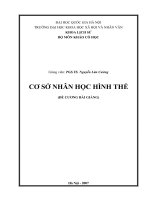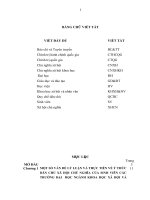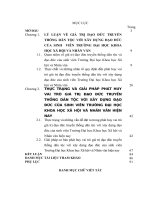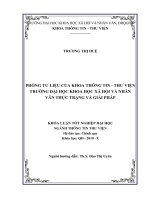GIÁO ÁN MẪU ANH VĂN TRƯỜNG ĐẠI HỌC KHOA HỌC XÃ HỘI VÀ NHÂN VĂN
Bạn đang xem bản rút gọn của tài liệu. Xem và tải ngay bản đầy đủ của tài liệu tại đây (164.86 KB, 25 trang )
THE UNIVERSITY OF SOCIAL SCIENCES AND HUMANITIES.
Faculty Of English Linguistics And Literature
Supervisor’s name: Dr. TRAN THI THANH DIEU
LESSON PLAN
NAME : TRAN THI THUY DUNG
CLASS : 04A
CODE : 0471026
GROUP : 5
HO CHI MINH CITY SCHOOLYEAR: 2008
CONTENT
CLASS OBSERVATION REPORT 2
CLASS OBSERVATION REPORT 1 3-4
CLASS OBSERVATION REPORT 2 5-6
CLASS OBSERVATION REPORT 3 7-8
LESSON PLAN 9
LESSON PLAN (The Whole Workshop) 10-14
LESSON PLAN (Micro Teaching) 15-18
APPENDICES 19-21
REFERENCE 22
2
CLASS OBSERVATION REPORT
3
CLASS OBSERVATION REPORT 1
Lesson: Chapter 8, Creativity.
Textbook : Mosaic 1.
Duration: 90 minutes.
A. Description of class:
Level: Intermediate.
Class size: 40.
Age: 18-20 years old.
B. Approach: communicative approach.
Main method: Communicative language teaching method.
Technique : Visual aids, oral practice, real situation.
Language: 90% English.
C. Aims and objectives:
Aim: To improve reading skill.
Objectives:
• Supply students more information about movies and the famous filmmaker, Steven Spielberg.
• Provide students more words related to movies and their synonyms.
• Help students know how to draw and paraphrase the main ideas in a text.
• Improve students’ speaking skill.
• Provide students some interesting knowledge about life.
D.Aids :
Board, chalk.
E.Procedures:
PRE-READING
Teacher’s activities Students’ activities Objectives
Ask the students questions
related to movies and invite
some students to speak out
what they know about movies.
Give out some famous films
and introduces the text about
Steven Spielberg, a famous
filmmaker.
Tell the teacher some
movies they know
Arouse the topic about movies and
filmmakers.
WHILE-READING
Ask students to read the text
about Steven Spielberg and do
the gap-filling exercise.
Correct the answers, give
feedback and explain the new
Read the text and do the
exercise. Some are
invited to speak out
their answers.
Enrich the students’ vocabulary stock about
movies.
4
words.
Ask students to discuss about
Steven Spielberg and
paraphrase the main
information about him.
Invite some students in some
groups to speak out their ideas
and discuss father about
themselves.
Discuss in group and
draw the main
information
Speak out what they can
draw out from the text
and start discussing
father with the teacher.
Improve students’ skill of drawing out the
main ideas in a text.
Improve students’ speaking skill.
POST-READING
Ask students to read a small
text about creativities of men
and women, and then answer
the questions below the text
individually.
Invite some students to answer
the questions.
Give feedback and discuss a
little further.
Read the text and try to
answer the questions.
Answer the questions
and discuss them with
the teachers.
Improve students’ skill of paraphrasing the
main information in a text and supply them
more knowledge about life.
Help students practice speaking.
5
CLASS OBSERVATION REPORT 2
Lesson : With A Little Help From My Friend.
Textbook : Listening In Action.
Duration : 45 minutes.
A. Description of class:
Level: intermediate.
Class size: 50.
Age: 18-50 years old.
B. Approach: communicative approach.
Main method: Communicative language teaching method.
Technique: Visual aids, oral practice, real situation.
Language: 90% English.
C. Aims and objectives:
Aims: To improve students’ listening skill.
Objectives:
• To improve students’ abilities of guessing the words when dealing with the gap-filling exercise.
• To supply students some basic short forms of some phases and sentences.
• To improve students' speaking skill.
D. Aids:
Textbook, handout, chalk, board, tape, cassette players.
E. Procedures:
PRE –LISTENING
Steps Teacher’s activities Students’ activities Objectives
Distribute the handout
containing a lyric of the
Beatles and ask the
students to find the new
words.
Explain the new words.
Ask students some
question about The
Beatles, a famous boy
band.
Take the handout and find
out the new words.
Answer the teacher’s
question about The Beatles.
Arouse the students’ interest about
the Beatles and one of their famous
songs
WHILE –LISTENING
Steps Ask students to guess the
words can possibly be
filled in the gaps by
identifying their part of
speech.
Guess the words Practice and Improve the students’
ability of doing the gap-filling
exercise
6
Play the tape and ask
students to fill the gaps in
the lyric.
Ask some students about
what they could hear.
Play the tape again and
give feedback.
In the next gap-filling
exercise, invite some
students and talk with them
about their jobs.
Ask some students to look
at the back of the previous
handout and read the
exercise in silence and
guess the possible words
can be chosen to fill in the
gaps.
Play the tape then ask some
students about their
answers.
Play the tape again, correct
the wrong answers and
explain the words.
Listen to the tape and fill in
the gaps.
The invited students give
out their answers.
Listen to the tape and
correct the wrong words.
The invited students talk
about their jobs.
Read the exercise and think
of the words can be used to
fill in the gaps.
Listen to the tape and speak
out the answers.
Change the topic and draw the
students’ interest about jobs.
Help students practice speaking.
POST –LISTENING
Step Give some short forms of
some phrases and
sentences people often
used when speaking.
Practice speaking out the
phrases and the sentences
and try to remember them.
Help students learn more short form
of phrases and sentences to listen
more effectively
7
CLASS OBSERVATION REPORT 3.
Lesson : work
Textbook : Milestone.
Duration : 90 minutes.
A. Description of class:
Level : intermediate
Class size: 40
Age : 25-35 years old.
B. Approach: communicative approach.
Main method: Communicative language teaching method.
Technique : Visual aids, oral practice, real situation.
Language : 90% English.
C. Aims and objectives:
Aim : To improve reading skill.
Objectives:
• Provide students more words related to work.
• Provide students some interesting knowledge about life.
• Improve students’ speaking skill.
D.Aids:
Board, chalk.
E.Procedures:
8
PRE-READING
Teacher’s activities Student’s activities Objectives
Introduce the lesson about
work
Write a proverb about work
and life on the board and
start the discussion.
Ask students to speak out
their ideas about that
proverb
Express the ideas and
discuss with the teacher.
Arouse the topic about work and
improve students’ speaking skill.
WHILE-READING
Ask students to find some
word relating to work
Give feedback and provide
some more words relating
to the topic given.
Ask students to read the text
and try to answer the
questions in groups
Read the questions and
invite some students to
answer.
Give the words relating to
work.
Read the text and discuss in
groups to find the answers.
The invited students answer
the questions and discuss
them with the teacher and
their mates.
Provide students more words
about work.
Help student practice reading
and understanding the text.
Help students practice speaking.
9
LESSON PLAN
10
LESSON PLAN
(THE WHOLE WORKSHOP)
Lesson : The Effects Of The Telephone.
Textbook: College Reading.
Duration: 90 minutes.
A. Description of class:
Level : intermediate.
Class size: 35.
Age : 18-25 years old.
Nationalities: Vietnamese.
B. Approach: communicative approach
Main method: Communicative language teaching method.
Technique: Visual aids, oral practice, real situation.
Language: 90% English.
C. Aims and objectives:
Aim: To improve reading skill.
Objectives:
• Improve students’ scanning and skimming skill.
11
• Improve students’ ability of drawing the needed information in the text.
• Enrich students’ stock of new words and phrases.
• Help students know clearly the effects of telephone and how it works.
• Improve students’ speaking skill and the sense of group working.
D. Aids:
Textbook, handout, chalk, board
E. Procedures:
PRE-READING (20 MINUTES)
Step Time
(Min
utes)
Teacher’s activities Student’s activities Objectives
1 5 Ask students some
questions
1. Do you have a
telephone?
2. Do you find it
useful or not?
Answer the teacher’s
questions.
Arouse the students’ interest about
the telephone.
2 5 Divide the students into
groups. Haft of the
groups will discuss about
the advantages of
telephone, the other haft
will discuss about the
disadvantages.
Discuss the question Help students visualize the effects
of telephones.
3 10 Invite some members of
their groups to talk about
their ideas. First is about
the advantages of
telephone, and then will
be the disadvantages.
The invited students
speak out their ideas
and give out the
reasons.
Improve students’ speaking skill
12
WHILE-READING (55 MINUTES)
1
2
3
5
15
10
Ask students to read the
whole text individually and
try to understand it.
Raise the first questions:
1.How can telephone help in
saving life?
Give explanation:
-It has saved lives by getting
rapid words of illness, injury,
or famine from remote places
Ask students about the part
of speech of the words after
the preposition By in the
phrases:
By getting rapid words….
By joining with the
elevator…
By bringing about the
quantum leap….
Give feedback and form:
By + Gerund: expressing
the way something happens.
Give form:
Preposition + Gerund
Ex: she is interested in
playing tennis
To + V-infinitive.
Ex: She decided to go to
England.
Ask students if they know
the difference between
Gerund and Present
participle.
Give explanation:
Gerund is used as Noun,
Object or Subject.
Ex: Playing tennis is fun.
Present Participle is used in
the progressive tense or as an
adjective.
Ex: The baby is crying.
I heard some surprising
news.
Raise the second question
2.In what way has telephone
Read the whole text
individually and try to
understand it
Give answers
Write down the answer
and make questions in case
they find something
unclear.
Answer the questions.
Write down the structure
and raise question if there
is something unclear.
Answer the questions
Improve students’ scanning
and skimming skill.
Checking students’s
scanning skill.
Help students master some
basic grammar points in
order
to understand the text more
clearly.
Help students remember the
13
caused wars?
Give feedback and the
answer.
- By magnifying and
extending irrational personal
conflicts based on voice
contact, it has caused wars.
Explain some new words:
Beyond doubt: completely
certain.
Cripple (v) ['kripl] : damage
somebody or something.
Chillingly (adv) ['t∫iliηli]: in a
frightening way.
Irrational (a) [i'ræ∫ənl]: not
using logical thought.
Inadequate (a) [in'ædikwit]:
not good enough.
Invoke (v) [in'vouk]: to make
sb have a particular feeling.
Ask students if they have any
other questions to ask and
discuss with them.
Raise the questions.
message in the first
paragraph and improve their
speaking skill.
Help students understand
the text clearly.
Improve students’ speaking
skill and help them get
through the text.
14
4
5
5
10
Divide the class into groups,
some will find out the
positive effects, the others
will find out the negative
effects of the telephone in
the first paragraph.
Invite some students to write
their answers on the board.
Ask students to give
feedback about their friends’
answers.
Give answer:
Positive effects:
Telephone helps
-Saving life
-Make the multistory
residence or office building
possible.
-Making the modern city
possible
-Preventing wars.
Negative effects:
Telephone
-Kills the ancient art of
writing.
-Makes the living alone
possible.
-Breaks up the
multigenerational household.
-Makes the waging of war
more efficient.
-Worsens the irrational
personal conflict, causing
wars.
-Extents human conflicts.
Discuss each other to draw
out the information in the
first paragraph.
Write the answers on the
board
Give feedback and discuss
the right answer with each
other and with the teacher.
Improve students’
skimming skill.
Help students remember the
main ideas in the text and
improve their ability of
group working.
6 10 Ask students to read the last
2 paragraphs individually
Invite some students and ask
them the questions:
3.What is the effect of
telephone on our emotions?
Read the 2 last paragraphs
Answer the questions and
start the discussion.
Improve students’ ability of
paragraph understanding
15
Give feedback and answer:
It evokes hope, relief, fears,
anxiety, and joy according to
our expectations.
4.How much can telephone
help friends and lovers?
Give feedback and
explanations:
-They need not identify
themselves by names even
when talking across oceans.
Answer the question.
POST-READING (15 MINUTES)
1 10 Ask students to do the
exercise in the handout about
word and phrase
understanding.
Ask the students about their
answers.
Give feedback
Do the exercise.
Give the answers.
Improve the ability of
guessing the meaning of
new words and phrases in a
text
5 Ask students to think about
the other technological
products that bring many
effects to human life.
Start the discussion. Improve students speaking
skill.
16
LESSON PLAN
(Micro Teaching)
Lesson : The Effects Of The Telephone.
Textbook : College Reading.
Duration : 30 minutes.
A. Description of class:
Level: intermediate
Class size: 35.
Age: 18-25 years old
Nationalities: Vietnamese.
B. Approach: communicative approach.
Main method: Communicative language teaching method.
Technique : Visual aids, oral practice, real situation.
Language : 90% English.
C.Aims and objectives:
Aim: to improve reading skill.
Objectives:
• To improve students’ ability of drawing the needed ideas in the text.
• To enrich students’ stock of new words and phrases.
• Help students know clearly the effects of telephone and how it works.
• To improve students' speaking skill and the sense of group working.
D. Aids:
Chalk. Board, handout.
E.Procedures:
WHILE-READING (55 MINUTES)
1
2
5
15
Ask students to read the
whole text individually and
try to understand it.
Raise the first questions:
1.How can telephone help in
saving life?
Give explanation:
-It has saved lives by getting
rapid words of illness, injury,
or famine from remote places
Ask students about the part
of speech of the words after
the preposition By in the
phrases :
By getting rapid words….
Read the whole text
individually and try to
understand it
Give answers
Write down the answer
and make questions in case
they find something
unclear.
Improve students’ scanning
and skimming skill.
Checking students’s scanning
skill.
17
3 10
By joining with the
elevator…
By bringing about the
quantum leap….
Give feedback and form:
By + Gerund: expressing
the way something happens.
Give form:
Preposition + Gerund
Ex: she is interested in
playing tennis
To + V-infinitive.
Ex: She decided to go to
England.
Ask students if they know
the difference between
Gerund and Present
participle.
Give explanation:
Gerund is used as Noun,
Object or Subject.
Ex: Playing tennis is fun.
Present Participle is used in
the progressive tense or as an
adjective.
Ex: The baby is crying.
I heard some surprising
news.
Raise the second question.
2.In what way has telephone
caused wars?
Give feedback and the
answer.
- By magnifying and
extending irrational personal
conflicts based on voice
contact, it has caused war
Explain some new words:
Beyond doubt: completely
certain.
Cripple (v) ['kripl] : damage
somebody or something.
Chillingly (adv) ['t∫iliηli]: in
a frightening way.
Irrational (a) [i'ræ∫ənl]: not
using logical thought.
Inadequate (a) [in'ædikwit]:
not good enough.
Invoke (v) [in'vouk]: to
Listen to teacher’s
explaination and ask the
teacher in case of
encountering something
unclear.
Answer the questions
Help students master some
basic grammar points in order
to understand the text more
clearly.
Help students remember the
message in the first paragraph
and improve their speaking
skill.
Help students understand the
text clearly.
18
make somebody have a
particular feeling.
Ask students if they have any
other questions to ask and
discuss with them.
Raise the questions. Improve students’ speaking
skill and help them get
through the text.
4
5
5
10
Divide the class into groups,
some will find out the
positive effects, the others
will find out the negative
effects of the telephone in
the first paragraph.
Invite some students to write
their answers on the board.
Ask students to give
feedback about their friends’
answers.
Give answer:
Positive effects:
Telephone helps
-Saving life
-Make the multistory
residence or office building
possible.
-Making the modern city
possible
-Preventing wars.
Negative effects:
Telephone
-Kills the ancient art of
writing.
-Makes the living alone
possible.
-Breaks up the
multigenerational household.
-Makes the waging of war
more efficient.
-Worsens the irrational
personal conflict, causing
wars.
-Extents human conflicts.
Discuss each other to draw
out the information in the
first paragraph.
Write the answers on the
board
Give feedback and discuss
the right answer with each
other and with the teacher.
Improve students’ skimming
skill.
Help students remember the
main ideas in the text and
improve their ability of group
working.
19
6 10 Ask students to read the last
2 paragraphs individually
Invite some students and ask
them the questions:
3.What is the effect of
telephone on our emotions?
Give feedback and answer:
It evokes hope, relief, fears,
anxiety, and joy according to
our expectations.
4.How much can telephone
help friends and lovers?
Give feedback and
explanations:
-They need not identify
themselves by names even
when talking across oceans.
Answer the questions and
start the discussion.
Answer the question.
Improve students’ ability of
paragraph understanding
20
APPENDICES
THE EFFECTS OF TELEPHONE.
What has the telephone done to us, or for us, in the hundred
years of its existence? A few effects suggest themselves at once.
It has saved lives by getting rapid words of illness, injury, or
famine from remote places. By joining with the elevator to
make possible the multistory residence or office building, it has
made possible-for better or worse-the modern city. By bringing
about the quantum leap in the speed and ease with which
information moves from place to place. Beyond doubt it has cripple if not killed the ancient art of letter
writing. It has made living alone possible for person with normal impulses; by so doing, it has played a
role in one of the greatest social changes of this century, the breakup of the multigenerational
household. It has made the waging of war chillingly more efficient than formerly. Perhaps it has
prevented wars that might have arisen out of international misunderstandings caused by written
communication. Or perhaps by magnifying and extending irrational personal conflicts based on voice
contact, it has caused wars. Certainly it has extended the scope of human conflicts, since it impartially
disseminates the useful knowledge of scientists and the babble of bores, the affection of the affectionate
and the malice of the malicious.
But the question remains unanswered. The obvious effects just cited seem inadequate, mechanistic;
they only scratch the surface. Perhaps the crucial effects are immeasurable. For some, to be hung up
on is among the worse of fears. Other dream of a ringing telephone and wake up with a pounding heart.
The telephone actual ring-more, perhaps, than any other sounds in life-invokes hope, relief, fear,
anxiety, joy according to our expectations.
In some ways it is in itself a thing of paradox. It is small and gentle in times of hugeness and violence.
It is basically simple in times of complexity. It is so near human, recreating voices so faithfully that
friends or lovers need not identify themselves by names even when talking across oceans
21
A. Comprehension question
1. How can telephone help in saving life?
2. In what way has telephone caused wars?
3. What is the effect of telephone on our emotions?
4. How much can telephone help friends and lovers?
B. Exercise:
1.What is the meaning of the suffix “multi” in multistory and multigenerational?
a. many b. few.
c.high. d.under.
2. The meaning of the phrase “scratch the surface” is:
a. To be the main problem. b.do not play the important role.
c.to be some side effects. d.cause the effects.
3. The phrase “bringing about “ in the first paragraph means:
a. preventing b.creating
c. Enhancing. d.stimulating.
4. What is the most suitable meaning for the phrase “to be hung up on”?
a. to be interupted b.to be disturbed.
c. to be annoyed. d. to be disconnected.
22
KEYS
EXERCISE B
1. A
2. C
3. B
4. D
23
Reference:
Quang Phu, Truong (2003). College Reading. National University.
Doff,A (1986). Teach English. Cambridge University Press.
Harmer, Jeremy (1983). The Practice Of Language Teaching. Longman group limited.
Sorseth, Ron et al (1995). Methodology Handbook For English Teachers In Vietnam. English
Language Institute- America.
24
25









